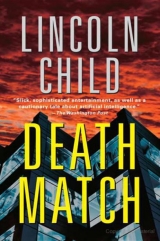
Текст книги "Death Match"
Автор книги: Lincoln Child
Соавторы: Lincoln Child
Жанр:
Триллеры
сообщить о нарушении
Текущая страница: 10 (всего у книги 26 страниц)
NINETEEN
The following morning, as he walked from a Manhattan parking garage, Lash stopped outside a magazine shop, set into the base of a vast apartment house and drowned in the shade of the facing buildings. He stepped inside, his eye quickly scanning the headlines of local and national newspapers: the Kansas City Star, the Dallas Morning News, the Providence Journal, the Washington Post. He breathed a small sigh of relief on finding no stories detailing double suicides among happily married couples. Leaving the shop, he turned right on Madison Avenue, heading for the Eden building. Now I know how Louis XVI must have felt, he thought; getting up each morning under the shadow of the axe, never knowing if this was to be the day of ultimate revelation.
Though he remained tired, he felt a little better about the night before. Borderlines like Mary English were excellent liars, actors in their own way. He’d done the right thing. He’d have to keep a close eye for future signs of stalking, just in case.
He arrived in the lobby a little early but Tara Stapleton was already there waiting for him. She was wearing a dark skirt and sweater, without jewelry of any kind. She smiled briefly, and they exchanged a few pleasantries about the weather, but she seemed as remote as she had the day before.
Leading him past the security perimeter and down a wide unmarked corridor, Tara instructed him in crisp sentences on the finer points of getting in and out of the inner tower. Although there were two entrance portals at Checkpoint I, the morning crush of employees meant a five-minute wait. Tara spoke very little, so Lash listened discreetly to the conversations going on around him. There was excited chatter about a memo that had circulated recently, reporting client applications were up thirty percent. There was remarkably little talk about last night’s ball game or how the morning commute had gone. It was as Mauchly said: these people genuinely loved what they did.
Once past the checkpoint, Tara showed Lash to an office reserved for him on the sixteenth floor. The door had no key, but was opened by a bracelet scanner. The office was windowless, but pleasantly bright and large, with a desk and table, a large empty bookcase, and a computer, also sporting a scanner. The only other feature was a small panel, set low in one wall, allowing access to the inner tower’s omnipresent data conduit.
“I’ve arranged to have all the results for the Thorpes and Wilners brought to you,” she said. “We’ll have the data terminal online for you this morning, and I’ll show you how to access records as needed. You’ll need to scan your bracelet before you can log on. Here’s my extension and cell number if you need to reach me.” She placed a card on the table. “I’ll come back for you at lunch.”
Lash pocketed the card. “Thanks. Where can I find coffee around here?”
“There’s a staff cafeteria down the hall. The bathroom’s that way, too. Is there anything else?”
Lash dropped his leather satchel on one of the chairs. “Could I have a whiteboard, please?”
“I’ll have one sent in.” With a nod, she turned gracefully and left the room.
For a moment, Lash stared thoughtfully at the space where she’d stood. Then he stowed his satchel inside one of the desk drawers and made his way to the cafeteria, where a Junoesque woman behind the counter cheerfully brought him a large espresso. He took it gratefully, sipped, found it excellent.
No sooner had he returned to his office and made himself comfortable than a technician knocked on the open door. “Dr. Lash?”
“Yes?”
The man wheeled in what looked like a black evidence locker, set on a steel cart. “Here are the documents you requested. When you’ve finished your examination, call the number stamped on the cartons and someone will pick them up.”
Lash lifted the heavy locker and placed it on the table. It was sealed with white tape that read HIGHLY CONFIDENTIAL AND PROPRIETARY – NOT TO LEAVE EDEN INTERNAL.
He closed the door to the office. Then he slit the tape and snapped open the lid. Inside were four large accordion files, each bearing a name and a number:

Each was sealed with white tape and bore an identical label:
EDEN CONFIDENTIAL MATERIAL
INTERNAL USE ONLY
L-3 AUTHORIZATION REQUIRED
NOTE: HARDCOPY WITHIN. DIGITAL MEDIA ALSO AVAILABLE.
USE REQUISITION AT-4849
Lash reached for Lewis Thorpe’s file. Then he hesitated: no, he’d leave Lewis Thorpe for last. Instead, he opened Lindsay Thorpe’s file and upended it onto the table. A flood of paper streamed out, much of it testing sheets and result forms, but also a thick spiral-bound packet that made little sense:
CODING SHEET FOLLOWS
Note: Summarization only
header
=====
telephony metrics – quantization
assembly period: 27 Aug 02/09 Sep 02
datastream: nominal
homogenization: optimal—
data location (hard): 2342400494234
first access sector 3024-a
compartmentalization algorithm set
chief operator: Pawar, Gupta
scrub chief: Korngold, Sterling
data gathering supervisor: Rose, Lawrence
hexadecimal source follows

It appeared to be some kind of machine-code summary of Lindsay’s telephone habits during her surveillance period. Readable or unreadable, it wasn’t the data he was interested in. Lash put this aside and picked up the test forms. They looked precisely like the tests he had taken just days before; the sight sent a fresh surge of mortification through him. He sipped his espresso, riffled through the pages, glancing at the little black circles Lindsay Thorpe had filled in so industriously. Her answers seemed to fall within normal ranges, and a quick glance at the scoring sheets confirmed this. His eye fell at last on the senior evaluator’s report.
* * *
Lindsay Torvald shows all signs of being well-adjusted socially, with a normative personality profile. Appearance, demeanor, behavior during and between the tests was within normal limits. Attention span, speech articulation, comprehension, and verbal skills were all within the top 10th percentile. Tests showed little abnormal scatter or skew, and validity scales were high across the board: the applicant seemed exceptionally candid and forthright. The projective inkblot test indicated creativity and a vivid imagination with only slight morbidity factors. The personality profile showed slight tendencies toward introversion but well within acceptable levels, especially given the strong indicators for self-confidence. The intelligence battery was also strong, particularly in the areas of verbal comprehension and memory; computation skills were weaker, but still the overall score gives the applicant a Full Scale IQ of 138 (modified WAIS-III).
In short, all quantifiable metrics suggest Ms. Torvald would make an excellent candidate for Eden.
R. J. Steadman, Ph.D.
August 21, 2002
There was movement in the corridor outside his door; a technician wheeled a whiteboard into his office. Lash thanked him, watched him leave. Then he put the report aside and reached for the testing forms once again.
By noon, he had studied the test results for three of the applicants. No smoking guns, no signs of incipient pathology. Across the board, the signs of depression, the suicide indexes, were extremely low. Lash replaced the stacks of paper into their respective folders; stood; stretched; then went down to the cafeteria for another espresso.
He walked back to his temporary office more slowly than he had left it. There was only one folder left: Lewis Thorpe’s. Thorpe, who specialized in invertebrate biology and enjoyed translating the poetry of Bash – o. Lash had spent several nights rereading Narrow Road to the Interior, putting himself in Lewis’s shoes, trying to feel what he’d felt in the testing suite, in that sun-filled Flagstaff living room where he had died under the gaze of his own infant child.
Eagerly – yet a little warily – Lash broke open the seal on the fourth folder.
It took less than half an hour to realize that what he most feared was, in fact, true. Lewis Thorpe’s test results showed him to be as normal and well adjusted as the rest. They showed an intelligent, imaginative, ambitious man with a healthy self-regard. No indicators for depression or suicide.
Lash slumped back in his chair and let the senior evaluator’s report fall from his hands. The tests he’d fought so hard to get brought him no closer to an answer.
There was a knock at his door, and he looked up to see Tara Stapleton leaning in, her long, intent face framed by thick auburn hair.
“Lunch?” she asked.
Lash gathered Lewis Thorpe’s papers together and stuffed them back into the folder. “Sure.”
Already, the cafeteria down the hall felt like an old friend. It was bright and almost festive, and more crowded now than it had been on his two earlier visits. He fell in line at the buffet rail, helped himself to another espresso and a sandwich, then followed Tara to an empty table near the rear wall. She’d taken only a cup of soup and some tea, and as Lash watched she tore open a packet of artificial sweetener and poured it into the cup. Her reserved, preoccupied silence remained. But right now, that seemed all right: he wasn’t eager to field a lot of questions about how his investigation was going.
“How long have you worked at Eden?” he asked after a moment.
“Three years. Since just after its founding.”
“And it’s as great a place to work as Mauchly says?”
“It always has been.”
Lash waited as she stirred her soup, a little uncertain what she meant by this. “Tell me about Silver.”
“How do you mean.”
“Well, what’s he like? He wasn’t at all what I expected.”
“Me, neither.”
“I take it this was the first time you’ve met him face to face.”
“I saw him once before, at the first anniversary celebration. He’s a very private person. Never leaves his penthouse, as far as anybody knows. Communicates by cell or videophone. It’s just him up there. Him and Liza.”
Liza. Silver had mentioned that name, too. At the time, Lash had thought it a slip of the tongue. “Liza?”
“The computer. His life’s work. What makes Eden possible. Liza’s his one true love. Kind of ironic, really, given the nature of our business. He does most of his communicating to the board and the staff through Mauchly.”
Lash was surprised. “Really?”
“Mauchly’s his right-hand man.”
Lash noticed that somebody was looking at him from across the cafeteria. The youthful face, the bright thatch of hair, seemed familiar. Then he realized who it was: Peter Hapwood, the evaluation engineer Mauchly had introduced him to the day of the class reunions. Hapwood smiled, waved. Lash waved back.
He returned his attention to Tara, who was once again stirring her soup. “Tell me more about Liza,” he said.
“It’s a hybrid supercomputer. Nothing else like it in the world.”
“Why?”
“It’s the only large computer built entirely around a core of artificial intelligence.”
“And how did Silver come to build it?”
Tara took a sip of tea. “You hear rumors. Stories, really. I don’t know exactly how true any of them are. Some people say Silver had a lonely, traumatic childhood. Others say he was coddled, doing differential equations at the age of eight. He’s never talked about it on record. All anybody knows for sure is, by the time he got to college, he was doing pioneering work in AI. Brilliant, genius-level stuff. His graduate work centered around a computer that could learn for itself. He gave it a personality, made its problem-solving algorithms more and more sophisticated. Eventually, he proved a computer that can teach itself could solve problems far more difficult than any hand-coded computer. Later, to finance further research, he farmed out Liza’s processing cycles to places like the Jet Propulsion Laboratory, the Human Genome Project.”
“And then he had his brainstorm. Eden, with Liza as the computational core. And the rest, as they say, is history.” Lash took a sip of coffee. “So what’s Liza like to work with?”
There was a pause. “We never get near the core routines or intelligence. Liza’s physical plant is in the penthouse, and only Silver has access. Everybody else – scientists, technicians, even the computer programmers – uses the corporate computer grid and Liza’s data abstraction layer.”
“Liza’s what?”
“A shell that creates virtual machines within the computer’s memory space.” Tara paused again. More and more pauses were creeping into her sentences. Then, abruptly, she stood up.
“I’m sorry,” she said. “Could we talk about this some other time? I have to go.”
And without another word she turned and left the cafeteria.
TWENTY
When Mauchly walked into the office around four, Lash was standing before his whiteboard. The man moved so silently Lash didn’t notice him until he was by his side.
“Christ!” Lash jumped, dropping his marker.
“Sorry. Should have knocked.” Mauchly glanced at the bulletin board. “Race, age, type, personality, employment, geographics, victims. What’s this?”
“I’m trying to type the killer. Assemble a profile.”
Mauchly turned his placid gaze on Lash. “We still don’t know there’s a killer.”
“I’ve gone over all your records. There’s nothing psychologically wrong with the Thorpes or the Wilners, zero clinical evidence of suicide. It would be a waste of time to explore that avenue further. And you heard what Lelyveld said in the boardroom: we don’t havetime.”
“But there’s no signs of murder, either. The Thorpes’ security camera, for one thing. It didn’t show anybody entering or leaving the house.”
“It’s a lot easier to cover up a murder than to cover up a suicide. Security cameras can be interfered with. Alarms can be bypassed.”
Mauchly thought about this. Then he looked back at the writing on the board. “How do you know the killer is in his late twenties or early thirties?”
“I don’t. That’s the baseline for serial killers. We have to start with the pattern, and refine from there.”
“And how about this: that he’s either well employed or has access to money?”
“He killed people on opposite coasts within a week of each other. That’s not the modus operandi of a drifter or a hitchhiker: their killing patterns chart erratically across short distances.”
“I see. And this?” Mauchly pointed to the scrawled words, TYPE: UNKNOWN.
“That’s the troubling part. Usually, we type serial killers as organized or disorganized. Organized killers control their crime scenes and their victims. They’re smart, socially acceptable, sexually competent. They target strangers, hide their corpses. On the other hand, disorganized killers know their victims, act suddenly and spontaneously, feel little or no stress during the crime, have few work skills, leave the victim at the scene of the crime.”
“And?”
“Well, if someone murdered the Thorpes and the Wilners, he exhibits traits of both the organized and disorganized killer. There’s no coincidence here: he’d have to know the victims. Yet he left them at the scene, like a disorganized killer. But again, the scene isn’t in the least bit sloppy. Such inconsistencies are extremely rare.”
“How rare?”
“I never came across a serial killer like it.”
Except once, came the voice in his head. He quickly pushed the voice far away.
“If we can get a fix on this guy,” Lash went on, “we can compare it against criminal records. Look for a match. Meanwhile, have you thought about keeping a sharp eye on the other four supercouples?”
“We can’t do a close surveillance for obvious reasons. And we can’t provide adequate protection until we know exactly what’s going on. But yes, we’re already getting teams in place.”
“Where are the rest located?”
“All across the country. The closest couple, the Connellys, live north of Boston. I’ll have Tara get you brief reports on all of them.”
Lash nodded slowly. “You really think she’s the right person for me to work with?”
“Why do you ask?”
“She doesn’t seem to like me. Or else she’s dealing with some issues that are distracting her.”
“Tara’s going through a hard time. But she’s the best we have. Not only is she chief security tech – which gives her access to every system – but she’s unique in having worked both the security and computer engineering sides of the company.”
“ Ifshe gets with the program.”
Mauchly’s cell phone went off, and he quickly raised it. “Mauchly.” A pause. “Yes, of course, sir. Right away.”
He replaced the cell phone. “That was Silver. He wants to see us, and right now.”
TWENTY-ONE
The day had grown dark and overcast, and the elevator doors opened onto a view far different than Lash had witnessed the day before. Only a handful of the cut-glass ceiling fixtures threw small pools of light across the vast room. Beyond the windows lay a gray stormscape of skyscrapers. The museum-like collection of thinking machines lay before them, hulking objects set against a lowering sky.
Richard Silver was standing by the bank of windows, hands clasped behind his back. At the elevator’s chime he turned.
“Christopher,” he said, shaking Lash’s hand. “Nice to see you again. Something to drink?”
“Coffee would be nice.”
“I’ll get it,” said Mauchly, moving toward a wet bar set into one of the bookcases.
Silver motioned Lash to the same table they’d sat at the day before. The magazines and newspapers were gone. Silver waited for Lash to sit, then took a chair across from him. He was wearing corduroys and a black cashmere sweater, sleeves pulled up his forearms.
“I’ve thought a lot about what you told me yesterday,” he said. “About these deaths not being suicide. I didn’t want to believe it. But I think you were right.”
“I don’t see any other possibility.”
“No, I didn’t mean that. I meant what you said about Eden being involved, either way.” Silver looked past Lash, his expression troubled. “I’ve been too wrapped up in my own projects, here in my ivory tower. I’ve always been more fascinated by pure science than applied science. Trying to build a machine that can think, learn, solveproblems on its own: that’s where my heart’s always been. Exactly what problems interested me less than the capabilityof solving them. It wasn’t until the idea for Eden came along that I grew personally involved. Finally, a task to which Liza was worthy: human happiness. Even so, I’ve kept removed from the day-to-day process. And I see now this was a mistake.”
Silver stopped, his gaze focused again on Lash. “I’m not sure why I’m telling you this.”
“People tell me I’ve got a face that inspires confidences.”
Silver laughed quietly. “Anyway, I finally decided that, if I’ve been uninvolved in the past, there wassomething I could do. Now.”
“What’s that?”
Mauchly returned, coffee in hand, and Silver stood. “If you’ll come with me?”
He led the way to a far corner, where the glass windows that ran around three sides of the room met the bookcases of the fourth. Here, Silver’s collection of computing machines appeared to run to the musical: a Farfisa Combo; a Mellotron; and a modular Moog synthesizer, all patch cords and low-pass filters.
Silver turned to him. “You said the killer was most likely a rejected Eden candidate.”
“That’s what the profile suggests. Perhaps a schizoid personality that couldn’t accept rejection. There’s a smaller chance the killer dropped out of the program afteracceptance. Or was one of those clients not matched within your five-cycle window.”
Silver nodded. “I instructed Liza to parse all accessible applicant data, looking for anomalies.”
“Anomalies?”
“It’s a little hard to explain. Imagine creating a virtual topology in three dimensions, then populating it with applicant data. Compress the data, compare it. It’s almost like the avatar matching Liza does every day, done in reverse. See, our applicants have alreadybeen psychologically vetted; they should all skew to tightly bounded norms. I was looking for applicants whose behavior, personality, lie outsidethose norms.”
“Deviants,” Lash said.
“Yes,” Silver looked pained. “Or people whose behavior patterns were out of sync with their evaluations.”
“How did you do this so quickly?”
“Actually, I didn’t. I instructed Liza on the nature of the problem, and she developed the methodology on her own.”
“Using the data from applicant testing?”
“Not only that. Liza also called on data trails left by rejected applicants and voluntary dropouts in the months or years since their original applications.”
Lash was shocked. “You mean, data gathered afterthey weren’t potential clients anymore? How is such a thing possible?”
“It’s called activity monitoring. It’s practiced by many large corporations. The government does it, too. We’re just a few years ahead of everybody else. Mauchly’s probably shown you some of its elementary uses already.” Silver smoothed the front of his sweater. “In any case, Liza flagged three names.”
“ Flagged?As in, already?”
Silver nodded.
“But there must have been a tremendous amount of data—”
“Approximately half a million petabytes. It would have taken a Cray a year to parse. Liza completed it in hours.” And he gestured at something near the wall.
Lash stared with fresh amazement at something he’d assumed was another antique from Silver’s collection. A standard computer keyboard sat on a small table, before an old-fashioned monochrome VDT terminal. A printer stood to one side.
“This is it?” Lash said incredulously. “This is Liza?”
“What did you expect?”
“I didn’t expect this.”
“Liza herself, or her computational plant, occupies the floors directly below us. But why make an interface more complicated than it has to be? You’d be surprised how much I can accomplish with just this.”
Lash thought about the computing feat Liza had just completed. “No, I wouldn’t.”
Silver hesitated. “Christopher, you’d mentioned another possibility. That the killer was somebody on our own staff. So I also instructed Liza to search for anything unusual, internally.” His expression grew tight, as if in physical pain. “She flagged one name.”
Silver turned to the small table, picked up two sheets of folded paper, and pressed them into Lash’s hand.
“Good luck – if that is indeed the right word.”
Lash nodded, turned to go.
“Christopher? One other thing.”
Lash glanced back.
“I know you understand why I gave this Liza’s highest priority.”
“I do. And thanks.”
He let Mauchly lead the way to the elevator, considering Silver’s last words. The same thought had also been running through his own head. The Thorpe couple had died on a Friday, eleven days before. The Wilners had died the following Friday. Serial killers liked consistency and pattern.
They had three days.








